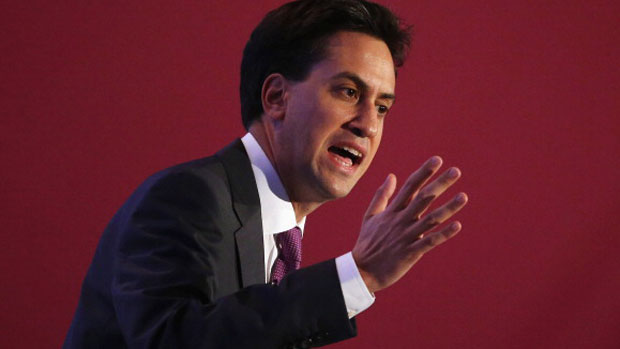Ed Miliband plans four million doorstep visits in bid for No 10
Labour leader urges activists to make face-to-face contact in four months leading up to election

A free daily email with the biggest news stories of the day – and the best features from TheWeek.com
You are now subscribed
Your newsletter sign-up was successful
Ed Miliband is urging Labour activists to carry out four million conversations with members of the public before the general election in May.
The Labour leader says this is twice the number carried out by the party in the same period in 2010 and more than any British political party has ever attempted before.
"We will win this election, not by buying up thousands of poster sites, but by having millions of conversations," he is expected to say at a rally in Manchester later today.
The Week
Escape your echo chamber. Get the facts behind the news, plus analysis from multiple perspectives.

Sign up for The Week's Free Newsletters
From our morning news briefing to a weekly Good News Newsletter, get the best of The Week delivered directly to your inbox.
From our morning news briefing to a weekly Good News Newsletter, get the best of The Week delivered directly to your inbox.
"I am going to be leading those conversations in village halls, community centres, workplaces right across the country, starting this very week and every week from now until the election. I want you to be doing the same. This year, we will be making our case, explaining our vision, house by house, street by street, town by town."
The Conservative party, which launched its poster campaign last week, is expected to outspend Labour by around 3-1, according to LabourList.
The Tories today accused Labour of promising unfunded spending commitments of £20.7bn in the first year if they win the general election. However, the BBC's political correspondent Chris Mason points out that the Conservatives have not said how the final figure was reached.
Mason adds there will be plenty of campaign posters and newspaper articles in the weeks to come "with many focusing on the 'central battleground' of the economy".
A free daily email with the biggest news stories of the day – and the best features from TheWeek.com
Today, Miliband will say the election amounts to a "contest between two different visions of how Britain can succeed".
But The Guardian's Patrick Wintour warns that both parties will struggle to reverse the trend towards protest voting.
"Truculent voters will have to be persuaded to shed their byelection frame of mind, and accept that this contest in essence remains a binary choice between two kinds of government for the next five years," he says. "Protest votes of Scottish nationalism, English nationalism or Green idealism might have suited the elections of 2014, but not the big choice of 2015."
-
 How Democrats are turning DOJ lemons into partisan lemonade
How Democrats are turning DOJ lemons into partisan lemonadeTODAY’S BIG QUESTION As the Trump administration continues to try — and fail — at indicting its political enemies, Democratic lawmakers have begun seizing the moment for themselves
-
 ICE’s new targets post-Minnesota retreat
ICE’s new targets post-Minnesota retreatIn the Spotlight Several cities are reportedly on ICE’s list for immigration crackdowns
-
 ‘Those rights don’t exist to protect criminals’
‘Those rights don’t exist to protect criminals’Instant Opinion Opinion, comment and editorials of the day
-
 How corrupt is the UK?
How corrupt is the UK?The Explainer Decline in standards ‘risks becoming a defining feature of our political culture’ as Britain falls to lowest ever score on global index
-
 Reforming the House of Lords
Reforming the House of LordsThe Explainer Keir Starmer’s government regards reform of the House of Lords as ‘long overdue and essential’
-
 How long can Keir Starmer last as Labour leader?
How long can Keir Starmer last as Labour leader?Today's Big Question Pathway to a coup ‘still unclear’ even as potential challengers begin manoeuvring into position
-
 The high street: Britain’s next political battleground?
The high street: Britain’s next political battleground?In the Spotlight Mass closure of shops and influx of organised crime are fuelling voter anger, and offer an opening for Reform UK
-
 Is a Reform-Tory pact becoming more likely?
Is a Reform-Tory pact becoming more likely?Today’s Big Question Nigel Farage’s party is ahead in the polls but still falls well short of a Commons majority, while Conservatives are still losing MPs to Reform
-
 The launch of Your Party: how it could work
The launch of Your Party: how it could workThe Explainer Despite landmark decisions made over the party’s makeup at their first conference, core frustrations are ‘likely to only intensify in the near-future’
-
 What does the fall in net migration mean for the UK?
What does the fall in net migration mean for the UK?Today’s Big Question With Labour and the Tories trying to ‘claim credit’ for lower figures, the ‘underlying picture is far less clear-cut’
-
 Will the public buy Rachel Reeves’s tax rises?
Will the public buy Rachel Reeves’s tax rises?Today’s Big Question The Chancellor refused to rule out tax increases in her televised address, and is set to reverse pledges made in the election manifesto